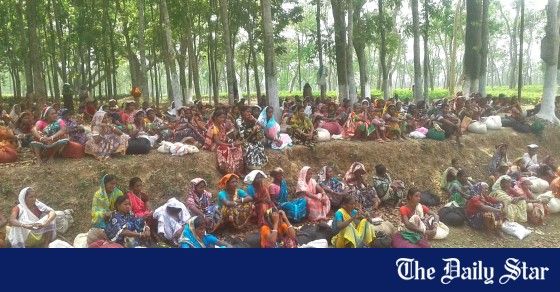
Unlocked tea-workers during lockdown

On April 15, workers of Kaliti Tea Garden, held a symbolic protest with empty cooking pots demanding their due wages of the last twelve weeks. - Collected
When the government announced countrywide lockdown to cut the spread of COVID-19, most of the industries were kept outside of the decision and tea workers are no different. They have to work in grueling conditions with very less health facilities and bare minimum wages, despite tea is more than one hundred and fifty years old industry. Mikha Piregu is the vice-president of University Tea Students’ Association who warns that the owners and the state have to pay high price if they fail to take necessary measures in time
WHEN districts of Sylhet division announced lockdown to curb the spread of COVID-19, at least 150 tea gardens were kept out of this decision. In these gardens, more than 150,000 permanent and temporary workers are currently employed and including their family members, more than 1.2 million people live in and around these tea estates.
On march 31, during a press conference with the district deputy commissioners and other administrative officials, the prime minister Sheikh Hasina affirmed to continue the operations of the tea gardens. In the conference, Syhlet district DC M Kazi Emdadul Islam informed the premier about work abstention in several tea gardens and workers’ reluctance to work in two gardens.
In response she said that export oriented sectors should continue production. Hasina also told the DC that tea workers work amidst the nature; they usually pick leaves keeping distance from one another and as the tea gardens have no chance of catch the COVID-19, there should not be any fear. The prime minister also mentioned to keep a distance among the workers when they submit their day’s work in line.
Such superficial comments from the top policy making level is a proof that the government and its administrative wings are not well versed about the tea gardens and its dynamics. International Labour Organisation published a study titled ‘A Study Report on Working Condition of Tea Plantation Workers in Bangladesh’ about the kind of condition tea workers have to work in. That study shows tea workers’ health aspects are vigorously neglected. The study on 297 tea plantation workers from 10 gardens found out that 63 per cent workers are at serious health risk.
There were six focus group discussion for the study. Members of the local governance body, society members, managers of tea gardens and government representatives were present in those discussions. Most of the gardens do not offer a simple shade for the workers to take shelter during rain. The workers are in serious lack of physical rest, security tools and sanitation facilities in work hours. Harassments while working are persistent as well as lack of nutritious diet are threatening workers’ health.
At least 75 per cent workers feel the adverse effects of their work on their health. 84 per cent workers are suffering from headache while 74 per cent are working with muscle ache. At least 72 per cent workers are suffering from back ache and 65 per cent workers have skin diseases. There are no security tools like rubber boots, mask and gloves to protect themselves from insects, snakes and different kinds of chemical compounds used for the production.
Due to such grueling working conditions most of the tea workers suffer from mental pressure. The labour law makes it compulsory to make separate toilets for male and female workers. However, tea workers are yet to see such facilities for them. A mere 13 per cent tea workers have the facility to take rest or have launch under tree shades which means the vast majority have to eat and take rest under rain or scorching sun.
The research says that only a handful of the gardens, even after they are in operation for over a century, offer the bare minimum of safe drinking water to the workers. The health centres of the tea garden have a few health workers under a compounder who are prescribing the same set of medicines for most of the diseases and most of the workers have complained about the quality of the medicines. The research also says that 68 per cent of the workers have discontentment about the health care facilities.
If we examine the trend of COVID-19 across the world, we can see that the people with comparatively weaker immune system or who have previous health conditions are at serious risk. In this regard, tea workers of Bangladesh are at the highest risk. So, locking down the whole country keeping the tea gardens operational is a poor decision which lacks foresight.
In the 166 years of tea producing history, this part of the world shattered previous all records to produce highest amount of tea in 2019. This industry, based on the toiling labour of the workers, is contributing more or less one per cent of the entire GDP. Even other industries of Bangladesh are announcing paid leave for the workers amidst the pandemic. The decision of keeping the tea gardens operational even during this crisis feels like the government and the owners are dreaming of breaking all previous records of tea production.
The tea workers’ unions inefficiency and flattery to the owners have keep them ineffective for the workers. Most of them have forgotten the historic ‘Dispel Solaiman’ movement during the 1969 mass uprising. Tea worker leader Solaiman was an agent of the ruling quarters who ignored the demands of the workers and used his power to douse workers’ protests. He was rejected by the workers and was ousted from the gardens.
However, the leaders after him also followed his footsteps and ran the labour unions to protect the interests of the owners. They were also focused on entertaining the workers and the government ignoring the demands of the workers. As a result, the dream of an effective tea workers’ union, which ignited the ‘Dispel Solaiman’ movement is yet to be realised.
The government understands GDP but does not or is unwilling to understand the sufferings of the economically marginalised people. The current prime minister promised, in the 2018 tea fair, to give two per cent interest soft loan to the owners of tea estates to construct living quarters for the workers. There is no update of that yet.
After decades of demands, in October 2019, the government announced tea workers wage board, however, the wages are not yet determined. It can be said that the tea workers will again be cheated by the government and the owners’ greed and indifference through the toll this time might be higher.
The government declared the entire Bangladesh as a high risk zone but did not bother to close the tea gardens gerpardising lives of more than 1.2 million people. This is a clear indication of the state’s indifference towards the tea works as well as two-barreled policy making. This also proves that the state is for the ruling class and not for the agricultural-tea workers.

On March 4, Rema Tea Garden in Chunurghat upazila of Habiganj closed due to a scuffle which occurred over tree plantation and when the authorities of the tea garden took possession of the playground of the estate. Following police cases filed by the authorities, more than five hundred workers have lost their jobs and did not receive their wages. Nearly a thousand families are continuing their lives in uncertainty and fear of harassment.
More than one thousands workers of the Kaliti tea Garden of Kulaura upazila in Moulvibazar did not receive their wages for the last three months. However, tea workers usually receive their wages in weekly basis. On April 15, the workers held a symbolic protest with empty cooking pots and utensils. They also marched seven kilometres on April 19 as a protest.
Bangladesh Constitution’s second section, titled ‘Fundamental Principles of State Policy’, in the Article 14, it is stated that ‘It shall be a fundamental responsibility of the State to emancipate the toiling masses the peasants and workers and backward sections of the people from all forms and exploitation’.
The state and subsequent governments have been legitimised the practice of exploit and repress the tea workers and keep them in the social and economic margin. This should be stopped. The tea workers should organise to claim their rights and protection of their lives.
The authorities should close the tea gardens, pay the workers’ salary and ensure required health facilities during the COVID-19 crisis. If they fail to do so, the government, the owners and the trade unions have to pay a high price. When the workers rise after decades of negligence of the state, no force can control their rebellion.
Mikha Piregu is the president of Jahangirnagar University unit of Bangladesh Students’ Union.


